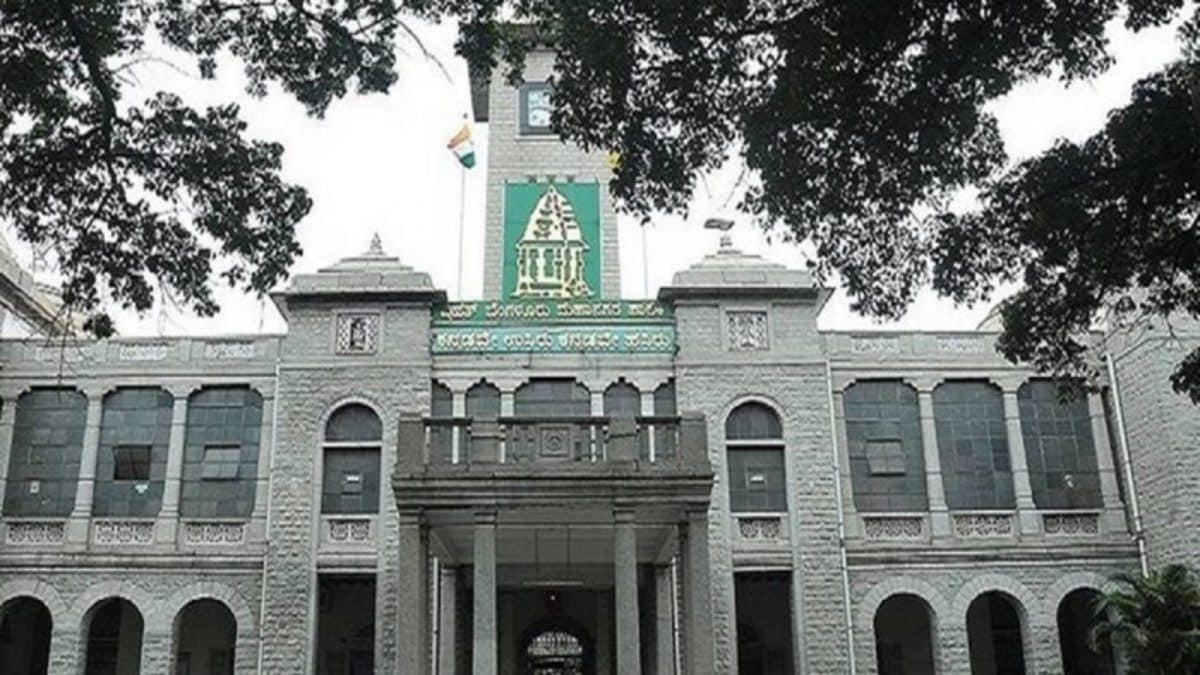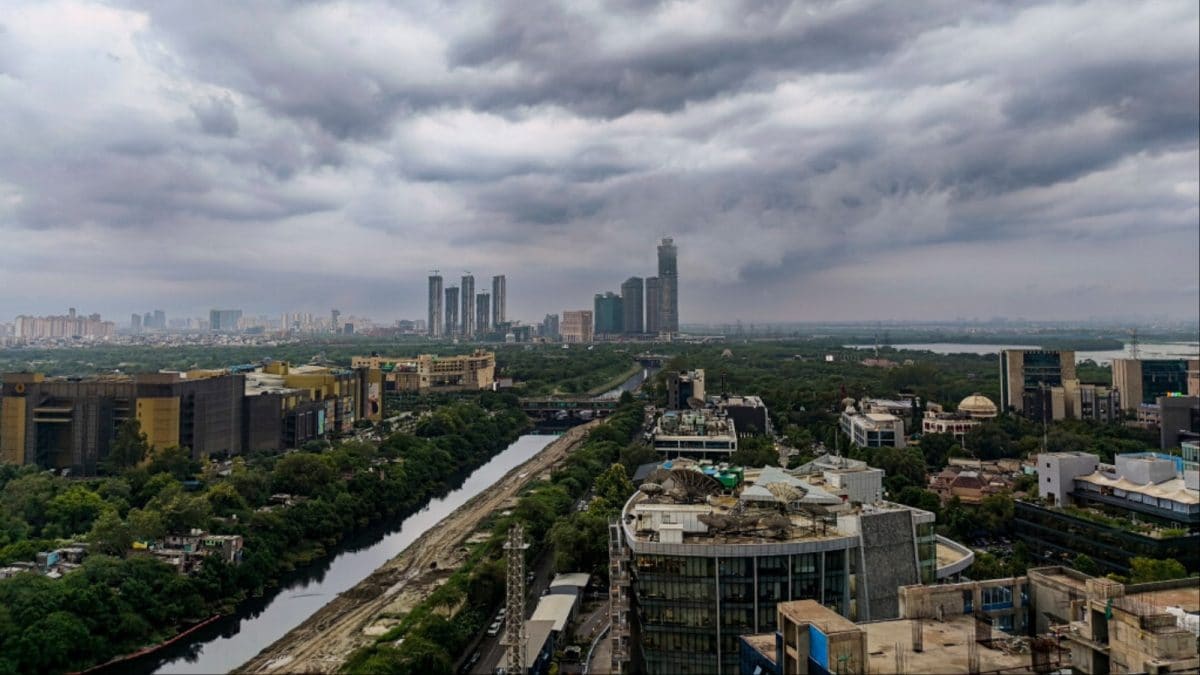Last Updated:
Described as a historic decision, this initiative aims to decentralise administration and speed up development in Bengaluru through five newly created municipal corporations

BBMP has now been replaced by the newly formed Greater Bengaluru Authority (GBA). (News18 Kannada)
Bengaluru has a new avatar as the city bid farewell to the Bruhat Bengaluru Mahanagara Palike (BBMP) that was steering the city until September 2 and is now replaced by the newly formed Greater Bengaluru Authority (GBA). According to the government, the plan is to create a world-class city with the management of Bengaluru handled in the most efficient manner.
With the GBA coming into effect, there will be five independent city corporations. By revamping its governance structure, it is believed that Bengaluru will now become a model city for governance, and the government hopes this will be replicated in other metro cities as well, said Congress MLA Rizwan Arshad, who chaired the joint legislative committee that vetted the Greater Bengaluru Governance Bill.
Recommended Stories
But it also comes with a price tag. Bengaluru’s new governance model—GBA and five municipal corporations—is set to come at a heavier cost, both administratively and politically. It is estimated to cost the government Rs 137 crore.
“When you have centralised power, you don’t have accountability or transparency. As a result, today Bengaluru’s condition, administratively, has gone into a very bad state. What we have tried to do through this Bill is to restructure Bengaluru into five smaller corporation units, because one corporation cannot manage a population of 15 million. It is too huge, and everything ends up running without transparency. The centralised approach, along with different para-agencies working on their own without any coordination, created this mess. We have addressed it now with GBA,” said Arshad.
The decentralised structure will also make governance more competitive. Each corporation will be assessed in the public domain, with citizens naturally comparing services between north, south, central, and other zones. This comparative spirit, Arshad argued, will push corporations to perform better in revenue collection, tackling local challenges like waterlogging, sanitation, and traffic, while the public will review the work and performance of the corporations.
Apart from the five-corporation restructuring, the mayoral tenure has been increased to 30 months, providing stability and leadership instead of constant change. Each of the five corporations will be autonomous, with its own council, powers of taxation, and decision-making authority.
Described as a historic decision, this initiative aims to decentralise administration and speed up development in Bengaluru through five newly created municipal corporations. The city’s in-charge minister and deputy chief minister DK Shivakumar said that the five corporations—Bengaluru East, Bengaluru West, Bengaluru North, Bengaluru South, and Bengaluru Central—will be headed by senior officers with extensive administrative experience and local connect.
Arshad explained that Bengaluru’s growth into an international hub, especially after IT liberalisation, has sprawled into peripheral rural areas. Different zones such as east, west, south, north, and the central business district (CBD) face distinct problems, and a uniform governance approach cannot solve them. By creating multiple corporations, each body can focus on the unique challenges of its geography while maintaining accountability and transparency.
“There will be competition and the people can see which corporation is faring better. People themselves will bring in the checks and balances and force the corporations to function better and in a transparent manner,” he said.
Bengaluru accounts for nearly 25 per cent of Karnataka’s population, with close to 15 million people, and has long been governed under a municipal act that cannot meet the scale or complexity of its challenges. Cities of the size of Bengaluru need a new model of urban governance, and GBA is the first such attempt in the country, claims the Congress.
Those working closely with the GBA explained to News18 that for years, the lack of a proper framework led to the creation of multiple parastatal agencies working vertically alongside the BBMP, which itself was spread over 800 sq km but centralised under a single commissioner and a mayor with just an 11-month tenure.
“This centralisation of power eroded accountability and transparency, resulting in the poor administrative state the city faces today,” explained an official who sought anonymity.
“We discussed the appointment of officials for the corporations, and we have decided to appoint those officials who are currently working locally,” Shivakumar told the media.
Politically, Arshad called this a massive opportunity for first-time politicians, who can grow and groom themselves into future MLAs and MPs. “It is a launch pad for a new breed of young minds and politicians,” he said.
Administratively, to ensure smooth functioning of Bengaluru—a city seen as “not functioning as it should be”—the government introduced GBA. This umbrella platform will bring together the five corporations along with parastatal agencies like BWSSB, BESCOM, BMTC, the Metro, suburban rail, and even the traffic police. Headed by the chief minister, the GBA will ensure that agencies and corporations work together, share information, and avoid duplication or conflicting actions. For the first time, all stakeholders will sit at the same table, making decisions through consultation.
The GBA will also add more workforce, with an additional 1,200 posts, pushing up the state’s expenditure by an estimated Rs 137 crore annually.
Earlier, the BBMP had a sanctioned strength of 22,411 with 3,621 vacancies and 18,790 employees working under it. There will be new hires in departments such as finance, accounts, town planning, IT, legal affairs, public health, survey and revenue which have been created under this.
With the GBA, the requirement of officials will rise to 23,689, which is 1,278 posts more than the current sanctioned strength, necessitating quick and decisive recruitment. On top of this, the creation of the five new corporations will require 1,580 posts, including engineers and several senior positions such as additional and joint commissioners. The salaries alone are projected to cost Rs 165 crore, explain GBA officials.
While budgetary allocations will remain largely similar, the government has ensured that if any corporation runs into a revenue deficit, the state will step in to bridge the gap. With 30 months of stable leadership for mayors and decentralisation of powers, the city will not only be easier to govern but also better positioned to fulfil its role as a global city, explain those who worked on creating GBA.
“This is the basic foundation,” Arshad said, “and through this structure, all other things will follow. Bengaluru is already in the global eye, but with this reform, we now have a workable formula for the city.”
About the Author

Rohini Swamy, Associate Editor at News18, has been a journalist for nearly two decades in the television and digital space. She covers south India for News18’s digital platform. She has previously worked with t…Read More
Rohini Swamy, Associate Editor at News18, has been a journalist for nearly two decades in the television and digital space. She covers south India for News18’s digital platform. She has previously worked with t… Read More
Loading comments…
Read More




